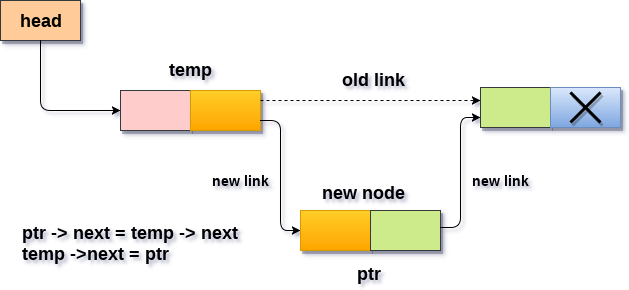在單連結串列指定節點之後插入節點
2019-10-16 22:03:21
要在指定的節點之後將新節點插入到連結串列中,需要跳過連結串列中所需數量的節點,以將指標移動到插入節點之後的位置。通過使用以下語句來完成。
emp = head;
for (i = 0;i < loc;i++)
{
temp = temp->next;
if (temp == NULL)
{
return;
}
}
為新節點分配空間,並將資料項新增到節點的資料部分。這將通過使用以下語句來完成。
ptr = (struct node *) malloc (sizeof(struct node));
ptr->data = item;
現在,只需要進行一些連結調整,將節點插入到指定的位置。 因為,在迴圈結束時,迴圈指標temp將指向將插入新節點的節點。 因此,新節點ptr的下一部分必須包含temp的下一部分的地址(因為,ptr將在temp和temp的下一個節點之間)。 這將通過使用以下語句來完成。
ptr -> next = temp -> next;
現在,只需要建立temp的下一部分,指向新節點ptr。 這將在指定位置插入新節點ptr。
temp ->next = ptr;
演算法
步驟1:如果 PTR = NULL
輸出 OVERFLOW 提示
轉到第12步
結束時間
第2步:設定 NEW_NODE = PTR
第3步:NEW_NODE→DATA = VAL
第4步:設定 TEMP = HEAD
第5步:設定 I = 0
第6步:重複第5步和第6步直到 I
第7步:TEMP = TEMP→NEXT
第8步:如果 TEMP = NULL
輸出 「希望不存在的節點」 提示
轉到第12步
結束時間
迴圈結束
第9步:PTR→NEXT = TEMP→NEXT
第10步:TEMP→NEXT = PTR
第11步:設定 PTR = NEW_NODE
第12步:退出
示意圖 -
C語言實現程式碼 -
#include<stdio.h>
#include<stdlib.h>
void randominsert(int);
void create(int);
struct node
{
int data;
struct node *next;
};
struct node *head;
void main()
{
int choice, item, loc;
do
{
printf("\nEnter the item which you want to insert?\n");
scanf("%d", &item);
if (head == NULL)
{
create(item);
}
else
{
randominsert(item);
}
printf("\nPress 0 to insert more ?\n");
scanf("%d", &choice);
} while (choice == 0);
}
void create(int item)
{
struct node *ptr = (struct node *)malloc(sizeof(struct node *));
if (ptr == NULL)
{
printf("\nOVERFLOW\n");
}
else
{
ptr->data = item;
ptr->next = head;
head = ptr;
printf("\nNode inserted\n");
}
}
void randominsert(int item)
{
struct node *ptr = (struct node *) malloc(sizeof(struct node));
struct node *temp;
int i, loc;
if (ptr == NULL)
{
printf("\nOVERFLOW");
}
else
{
printf("Enter the location");
scanf("%d", &loc);
ptr->data = item;
temp = head;
for (i = 0;i < loc;i++)
{
temp = temp->next;
if (temp == NULL)
{
printf("\ncan't insert\n");
return;
}
}
ptr->next = temp->next;
temp->next = ptr;
printf("\nNode inserted");
}
}
執行上面範例程式碼,得到以下結果 -
Enter the item which you want to insert?
12
Node inserted
Press 0 to insert more ?
2